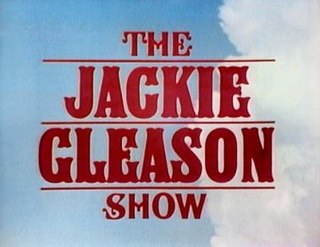Related Research Articles

The DuMont Television Network was one of America's pioneer commercial television networks, rivaling NBC and CBS for the distinction of being first overall in the United States. It was owned by Allen B. DuMont Laboratories, a television equipment and television set manufacturer & broadcasting company. DuMont was founded in 1940 and began operation on August 15, 1946.

The Arthur Murray Party is an American television variety show that ran from July 1950 until September 1960. The show was hosted by dancers Arthur and Kathryn Murray, the show featured various acts and celebrity guests and acted as advertisement for their chain of dance studios. Each week, the couple performed a mystery dance, and the viewer who correctly identified the dance would receive two free lessons at a local studio.

The Jackie Gleason Show is a series of American network television shows that starred Jackie Gleason, which ran from 1952 to 1970, in various forms.

Queen for a Day was an American radio and television game show that helped to usher in American listeners' and viewers' fascination with big-prize giveaway shows. Queen for a Day originated on the Mutual Radio Network on April 30, 1945, in New York City before moving to Los Angeles a few months later and ran until 1957. The show then ran on NBC Television from 1956 to 1960 and on ABC Television from 1960 to 1964.

Dennis James was an American television personality, philanthropist, and commercial spokesman. Until 1976, he had appeared on TV more times and for a longer period than any other television star. Alternately referred to as "The Dean of Game Show Hosts" and the "Godfather of Gameshows", he was the host of television's first network game show, the DuMont Network's Cash and Carry (1946).

John Reed King was an American radio and television game show host who hosted numerous game shows during the 1930s, 1940s, and 1950s.
Dollar a Second is an American comedy game show hosted by Jan Murray which originally aired from September 20, 1953, to June 14, 1954, on the DuMont Television Network. It was based on the French radio program Cent Francs par seconde.

Pantomime Quiz, initially titled Pantomime Quiz Time and later Stump the Stars, was an American television game show produced and hosted by Mike Stokey. Running from 1947–59, it was one of the few television series – along with The Arthur Murray Party; Down You Go; The Ernie Kovacs Show, The Original Amateur Hour; and Tom Corbett, Space Cadet – to air on all four TV networks in the US during the Golden Age of Television.

The Wendy Barrie Show is an American talk show hosted by Wendy Barrie, which aired from November 10, 1948, to September 27, 1950.
Boxing from St. Nicholas Arena was an American sports program originally broadcast on NBC from 1946 to 1948, and later on the now-defunct DuMont Television Network from 1954 to 1956.
Down You Go is an American television game show originally broadcast on the DuMont Television Network. The Emmy Award-nominated series ran from 1951 to 1956 as a prime time series primarily hosted by Dr. Bergen Evans. The program aired in eleven different timeslots during its five-year run.
Play the Game, also known as Let's Play the Game, was one of the earliest game shows to be broadcast over an American television network, and the first known example of a television panel show. In 1941-42, CBS aired an early game show, CBS Television Quiz.
Break the Bank is an American quiz show which aired variously – and sometimes co-existed in separate radio and television forms – on Mutual Radio, ABC Radio and NBC Radio Network, as well ABC, CBS and NBC television, from 1945 to 1957. From October 1956 to January 1957, NBC aired a short-lived prime-time television version called Break the $250,000 Bank.
On Your Way was an American game show that aired on the DuMont Television Network from September 9, 1953, to January 20, 1954, before moving to ABC from January 23 to April 17.
Blind Date is an American television game show which aired on ABC, NBC, and then DuMont after many years on radio.
Talent Jackpot was an American game show broadcast on the DuMont Television Network from July 19 to August 23, 1949.
All About Baby is an American daytime television series offering tips for mothers that aired from October 15, 1954, to July 1955 on several stations of the DuMont Television Network, including flagship station WABD.

Twenty Questions, based on the guessing game Twenty questions, started as a radio quiz show in 1946. The television series ran on NBC in 1949, on ABC from 1950 to 1951 and on the DuMont Television Network from 1951 to 1954.
References
- 1 2 3 "Debuts, Highlights, Changes (Continued)". Ross Reports on Television including The Television Index. September 3, 1950. p. 2. Retrieved September 17, 2022.
- ↑ McNeil, Alex (1996). Total Television: the Comprehensive Guide to Programming from 1948 to the Present (4th ed.). New York, New York: Penguin Books USA, Inc. p. 154. ISBN 0-14-02-4916-8.
- ↑ "'Chance' Exits DuM In Shift to ABC-TV". Variety. June 1, 1955. p. 24. Retrieved September 20, 2023.
- ↑ "UCLA Library Catalog - Titles". cinema.library.ucla.edu. Archived from the original on 11 July 2012. Retrieved 27 January 2022.